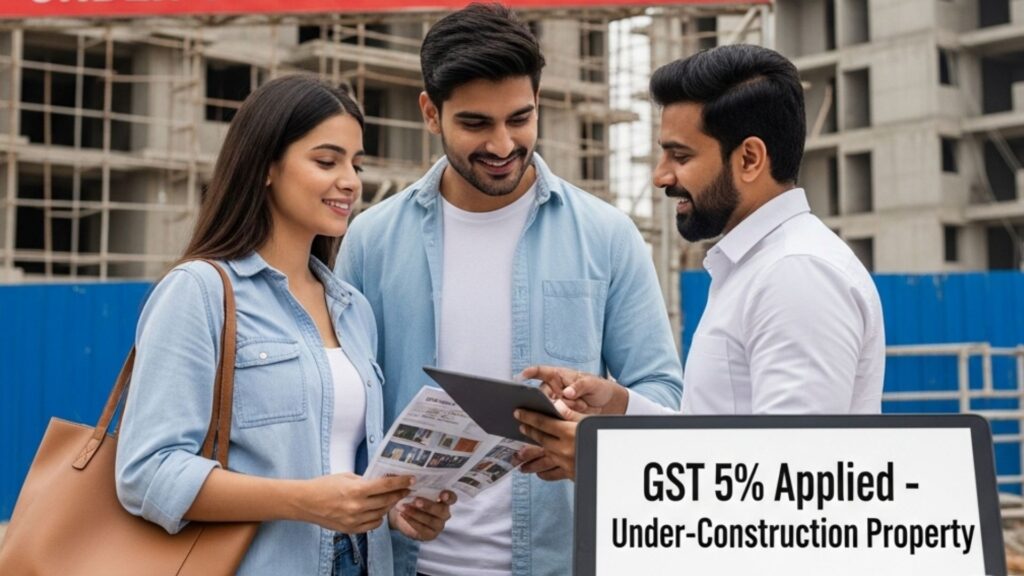Planning to buy a new home in 2025? If the property is still under construction, one key cost you shouldn’t overlook is GST (Goods and Services Tax). Many homebuyers in India often ask, “Do I need to pay GST on an under-construction property?” or “How does GST affect my total cost of buying a flat?”
In this guide, we’ll explain how GST on under-construction property works in 2025, what rates apply, who is exempt, and how you can make an informed decision before investing in your dream home.

Table of Contents
What Is GST on Under-Construction Property?
The Goods and Services Tax (GST) is a unified indirect tax applied on the supply of goods and services. When you buy a property that’s still under construction, the government considers it as a supply of service, and hence GST applies.
Completed or ready-to-move-in properties are not subject to GST, as they fall under the category of immovable property, not services.
GST Rates on Under-Construction Property in 2025
As per the current GST structure (unchanged as of July 2025), here are the applicable rates:
| Type of Property | GST Rate | Input Tax Credit (ITC) |
|---|---|---|
| Affordable Housing (as per govt. definition) | 1% | No |
| Non-Affordable Housing | 5% | No |
| Commercial properties (under construction) | 12% | With ITC |
Note:
Affordable housing is defined as:
- Carpet area up to 60 sq.m. (metro) or 90 sq.m. (non-metro)
- Property value under ₹45 lakhs
When Is GST Applicable?
GST applies only if:
- The builder is registered under GST
- The buyer is purchasing before completion or before the Occupancy Certificate (OC) is issued
- The payment is made in part or full during construction
Once the OC is issued and the property is considered ready-to-move, GST is not applicable, regardless of payment timing.
Cost Implications for Homebuyers
Here’s how GST adds to your overall cost:
- For a ₹50 lakh non-affordable home, 5% GST = ₹2.5 lakh additional
- For affordable housing, 1% GST = ₹50,000
- Since Input Tax Credit (ITC) is not allowed under new rules (from April 2019 onward), builders often pass on this cost to buyers
So, if you’re buying a home still under construction, factor in this extra amount when calculating your budget.
How to Check GST Charges While Buying Property
Always ensure:
- GST details are clearly mentioned in the builder-buyer agreement
- The builder has a valid GSTIN (GST registration number)
- Your invoices reflect the correct GST rate based on property type
Check for local RERA registration (e.g., MahaRERA, TNRERA, TS RERA) and validate the builder’s credentials to avoid overcharging.
GST on Under-Construction Plot + Construction Package
If you’re buying a plot with a construction service bundled, GST applies only to the construction part, not the land. But if both are sold as a combined deal, the total amount may attract 5% GST.
So, always ask for a break-up invoice or agreement.
State-Specific Observations
Though GST is a central tax, many state RERA authorities (like DTCP Haryana, IGRS Maharashtra, APIGRS) closely monitor under-construction sales to ensure GST compliance.
Before signing, check:
- The OC status of the property
- Whether the builder is billing separately for GST
- If you are eligible for affordable housing rates
Buying Under-Construction vs Ready-to-Move: GST Difference
| Criteria | Under-Construction | Ready-to-Move-in |
|---|---|---|
| GST Applicable? | Yes | No |
| OC Available? | No | Yes |
| Budget Impact | +1% to +5% | Lower overall |
| Possession Time | Future | Immediate |
So, while under-construction homes may offer lower base prices or flexible plans, the GST factor can increase the final cost.
Conclusion
Buying an under-construction property in 2025? Make sure you’re not caught off guard by the GST implications. While these taxes may seem like a small percentage, they can significantly impact your total investment—especially without the benefit of Input Tax Credit. By understanding how GST on under-construction property works, checking your builder’s compliance, and choosing the right type of property, you can make financially sound decisions.
To avoid unnecessary confusion, always read the builder-buyer agreement carefully, confirm if the project has a valid Occupancy Certificate, and know the GST rate applicable to your purchase.
Want to Buy Verified Plots?
Explore legally approved, ready-to-register plots at Openplot.com — where verified sellers and buyers connect without brokerage charges. All listings undergo legal verification to ensure a safe, GST-free experience for buyers looking at direct land ownership.
Frequently Asked Questions
1. Do I need to pay GST on a ready-to-move-in flat in 2025?
No. If the builder has received the Occupancy Certificate, GST does not apply.
2. Can I claim Input Tax Credit on an under-construction property?
No. Since April 2019, ITC is not allowed for residential buyers under the standard scheme.
3. What if I pay after the property is completed—will GST still apply?
If the Occupancy Certificate is issued before payment, GST is not applicable—even for balance payments.
4. Does GST apply to resale flats?
No. GST is not applicable on resale properties, as these are considered secondary market transactions.
5. Can GST rates change during the construction period?
Unlikely in 2025 unless the GST Council updates the structure. However, always monitor for official changes.